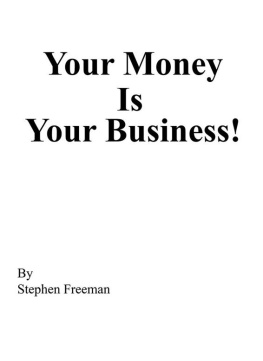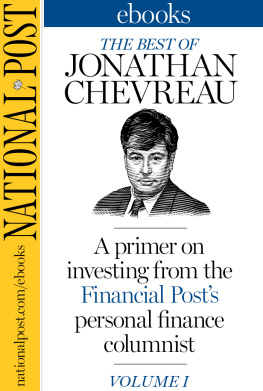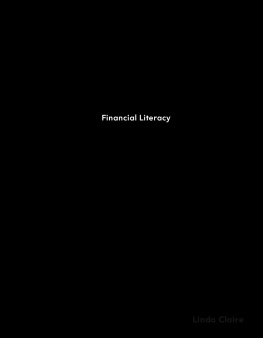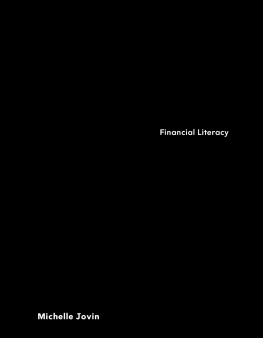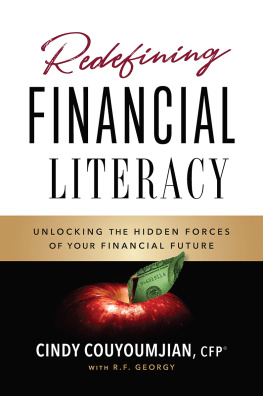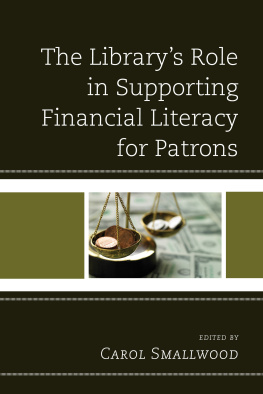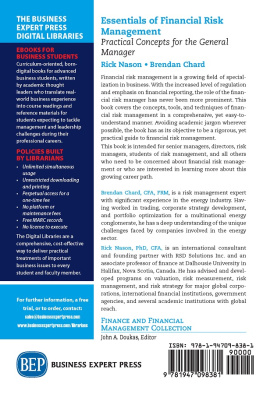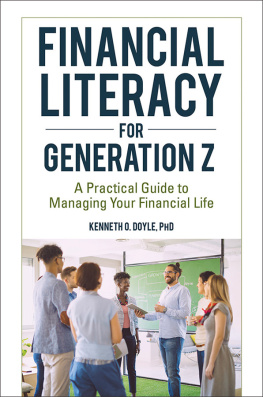YOUR MONEY
IS
YOUR BUSINESS!
- By
Stephen Freeman

AuthorHouse
1663 Liberty Drive
Bloomington, IN 47403
www.authorhouse.com
Phone: 1 (800) 839-8640
2017 Stephen Freeman. All rights reserved.
No part of this book may be reproduced, stored in a retrieval system, or transmitted by any means without the written permission of the author.
Published by AuthorHouse 08/21/2017
ISBN: 978-1-5246-6916-4 (sc)
ISBN: 978-1-5246-6915-7 (e)
Library of Congress Control Number: 2017901907
Because of the dynamic nature of the Internet, any web addresses or links contained in this book may have changed since publication and may no longer be valid. The views expressed in this work are solely those of the author and do not necessarily reflect the views of the publisher, and the publisher hereby disclaims any responsibility for them.
( www.ymiyb.com )
The website for this book at ( www.ymiyb.com ) contains formats you can use to begin preparing a current financial statement, personal business plan, and a projected financial statement budget. You will be reading about these financial management tools in Chapter 4. The website also contains other information you might find useful.
Dedication
To my father Stanley Whitman Freeman, Jr., for the gift of books.
To my mother Lyllian Freeman, for the gift of words.
To my sister Judith Freeman McSweeney DeVan, may her eternal light shine from Monarch Bay.
To my sister Barbara Freeman Zimmerman, for the gift of her love at work in the world.
Table of Contents
5 Good reasons to read this book
1. Many ideas to think about and suggestions to consider that might help you :
- Increase your income.
- Reduce your spending.
- Increase your savings.
- Improve your investment management.
- Focus your thinking on how to live a satisfying life in pursuit of your dreams.
It is an introduction to the universe of financial literacy resources that are available to you advisors, classes, books, the internet, etc. If you were to read no other book, I would urge you to read The Way to Wealth written by Benjamin Franklin in 1757 for my money, the granddaddy of all personal financial management self-help books. It is staggering how much wise advice Franklin crammed into so few pages in such an entertaining and understandable way. Financial advisors today still preach most of what Franklin wrote all those years go.
3. Its ho nest .
- The book doesnt dodge the fact that improving the way you manage the money in your life is likely to require you to change some of your behavior - and changing behavioral habits can be tough. Think about all the New Years resolutions that are made in December and broken in January.
- It doesnt try to sell a quick and easy miracle way to wealth. There is no miracle way.
4. It can be used as a tool that might help make it easier to talk with your family members about m oney .
- Many people find it tough to talk with family members about money, especially when they think family members are having a negative impact on their money.
- Having a non-family member like me raise money management issues that lots of other families are also confronting can take some of the sting out of you raising these potentially touchy issues.
- Consider asking family members to read the book and then have a family meeting to discuss those parts that you think are relevant to your family.
- If you are finding it particularly tough to talk with a family member about a specific issue, consider reading relevant pages together as a means to help stimulate a healthy conversation and keep the conversation from seeming threatening or annoying.
5. Its likely to be one of the easiest to understand books about money management that you will be able to find . I tried to write as if I were talking to family and friends.
DISCLAIMER : the only professional license I hold is that of a property and casualty insurance agent. I am NOT certified or licensed as a personal financial planning professional or life coach. I am NOT certified or licensed to offer you advice as to how to manage your money, your career, or your life. Discuss the ideas and suggestions in this book with appropriately licensed professionals in the fields of study we touch upon, such as financial planning, career management, accounting, law, and family counseling . Question everything said in this book . Think for yourself. Make well-informed and well-reasoned decisions about what is best for you to do in your life based upon all the unique circumstances of your life. Pay close attention to Chapters 7and 8 regarding decision making and gathering decision making informa tion.
Reasons I wrote the book
Encourage readers to help themselves improve the way they manage their mone y by :
- Managing their money as if it was a business.
- Preparing written business plans and projected financial statement budgets.
- Developing and using a formal decision making process.
- Learning and adopting the best practices of successful business managers.
- Heeding the consensus financial management advice of the financial service industries.
- Understanding that the amount of money in their lives is mostly a function of lifestyle choices they make.
- Realizing that if they feel they are drowning in financial despair there are professional financial lifeguards who would jump in to help save them if they just called out for help.
My hope is that you will be able to use the book to help improve the way you manage your money.
My dream is that enough people use the book to help improve the way they manage their money that their actions combine to make a noticeable contribution to managing the serious financial challenges we all face together as a nation. Our financial challenges include:
1. Too many people are suffering through financial crises such as:
- Buried under a mountain of debt and distraught about their ability to dig out from under.
- Out of work and having a real hard time finding a new job.
- Trying to figure out how to pay big medical bills.
- Getting closer and closer to retirement age and thinking that they havent saved enough money to afford a comfortable retirement.
2. Even more people are worried enough about money that their worry is affecting their he alth .
3. Many more voters need a more functional knowledge of the fundamentals of prudent financial management if we are to avert a national financial catastrophe that hurts us all . A number of pressing issues will require financially savvy government leadership and mind-boggling amounts of money in order to deal with them effectively. The greater the contribution that each of us as a financially savvy voter makes toward dealing with these massively expensive issues, the better the quality of life each of us will have in the future. These issues include:
- Developing an economically sustainable plan to finance programs such as Social Security, Medicare and Medicaid far out into the future.
- National security in this new era of physical and cyber terrorism.
- Infrastructure maintenance and improvements: aging roads and bridges (how quickly we forget after a bridge collapses or a section of elevated highway drops); mass transit systems; water and sewer treatment plants; electricity grid; etc. Research the trillions of dollars that the American Society of Civil Engineers says we should be budgeting to spend on infrastructure, and the far too little money we are actually budgeting to s pend .
- Escalating rate of global economic competition that requires us to develop a viable plan for retaining our current jobs and creating new jobs (e.g. globally competitive tax code).
Next page
